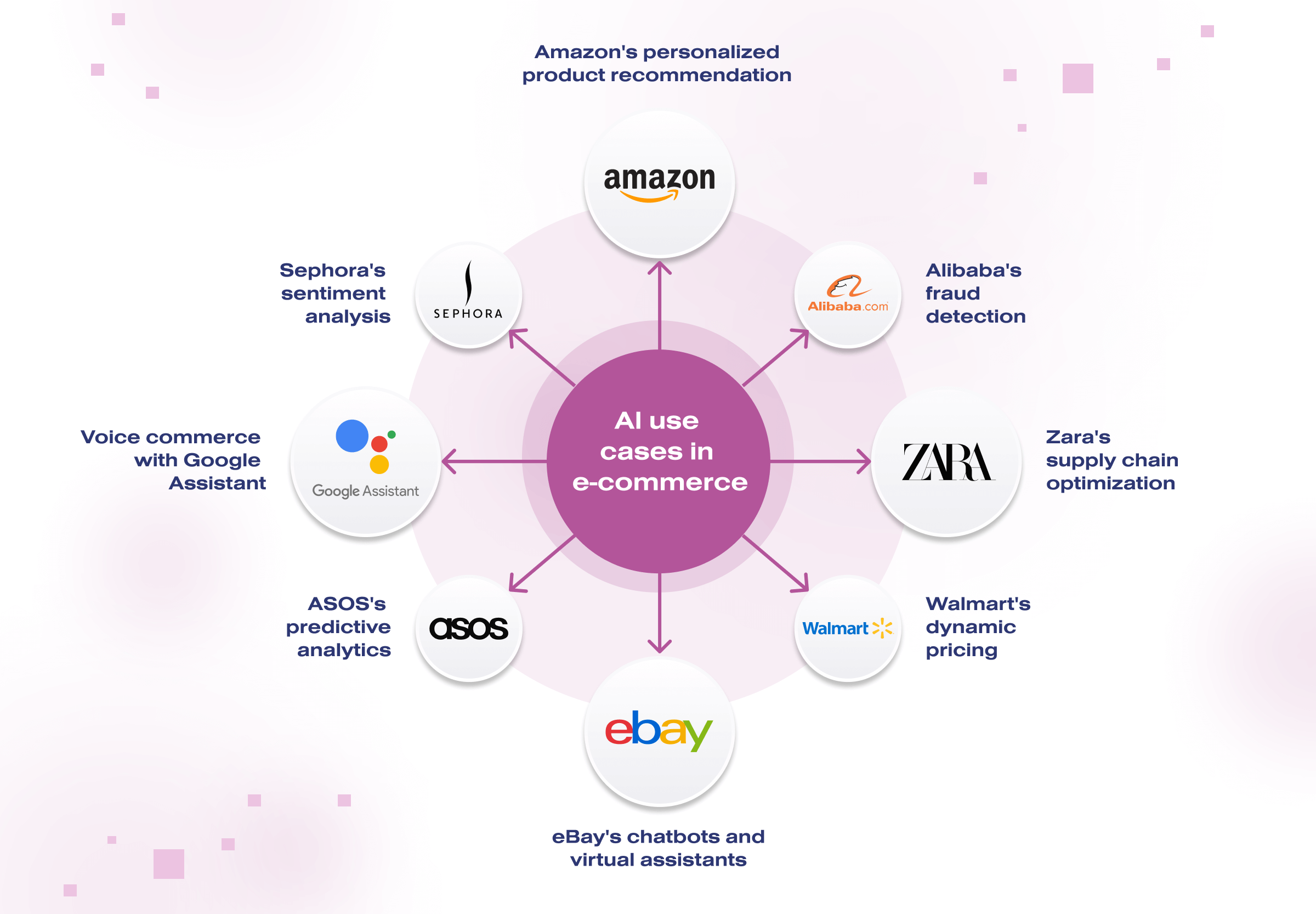The Influence of AI in E-Commerce: Revolutionizing Online Shopping
In recent years, the world of e-commerce has undergone a remarkable transformation, thanks to artificial intelligence (AI). From personalized shopping experiences to advanced data analytics, AI has emerged as a game-changer in the way consumers shop and businesses operate. As AI technology continues to evolve, its role in e-commerce becomes even more pivotal, reshaping the landscape and offering new opportunities for businesses to connect with customers.
In this article, we will delve into how AI is transforming e-commerce, its benefits, and the various AI applications that are making an impact in the industry.

Understanding AI and Its Role in E-Commerce
AI refers to the capability of machines to perform tasks that would typically require human intelligence, such as decision-making, speech recognition, and pattern recognition. In the context of e-commerce, AI technologies are utilized to enhance customer experiences, streamline operations, and drive growth.
Key areas where AI impacts e-commerce include:
- Personalization: Tailoring shopping experiences to individual customers’ preferences.
- Customer Service: AI-powered chatbots and virtual assistants that provide 24/7 support.
- Inventory Management: AI algorithms that predict demand and optimize stock levels.
- Sales Forecasting: Using AI to predict trends and adjust marketing strategies accordingly.
The Power of Personalization in E-Commerce
One of the most significant contributions of AI to e-commerce is personalization. Consumers today expect tailored experiences, and AI is helping businesses deliver on these expectations. By analyzing customer behavior, preferences, and past interactions, AI can provide personalized product recommendations, promotions, and content.
How AI Personalizes the Shopping Experience
- Product Recommendations: AI uses data such as previous purchases, browsing history, and user preferences to recommend products that are most likely to appeal to the individual. This leads to higher conversion rates and increased sales.
- Targeted Marketing: AI helps brands deliver personalized ads and offers to customers. By leveraging machine learning algorithms, businesses can create dynamic, personalized ad campaigns based on customer data.
- Dynamic Pricing: AI algorithms can adjust pricing in real-time based on market demand, competitor prices, and customer behavior. This allows businesses to optimize pricing strategies and offer competitive pricing to customers.
Why Personalization Matters
Personalization is crucial for enhancing customer loyalty and improving customer retention rates. According to studies, personalized shopping experiences increase the likelihood of customers making a purchase and encourage repeat business. Businesses that utilize AI to deliver personalized experiences are able to build stronger relationships with their customers.

AI-Powered Customer Service: 24/7 Support at Your Fingertips
Another area where AI is making a significant impact in e-commerce is customer service. AI chatbots and virtual assistants have become essential tools for businesses to provide round-the-clock support to their customers.
The Role of Chatbots in E-Commerce
AI chatbots are designed to simulate human conversation, providing customers with immediate responses to their queries. These chatbots can handle a wide range of tasks, including:
- Answering Frequently Asked Questions (FAQs): Chatbots can provide quick answers to common questions about products, shipping, returns, and more.
- Order Tracking: Customers can use chatbots to track their orders, check delivery statuses, and receive updates about their purchases.
- Product Recommendations: Chatbots can offer personalized product recommendations based on customer preferences and browsing history.
By integrating AI chatbots into their websites or mobile apps, businesses can enhance the customer experience and reduce the need for human customer service representatives. This not only improves efficiency but also saves costs.
AI and Inventory Management: Optimizing Stock Levels
Efficient inventory management is critical for e-commerce businesses. Over-stocking can lead to higher storage costs, while under-stocking can result in missed sales opportunities. AI algorithms can help businesses manage their inventories more effectively by predicting demand and optimizing stock levels.
How AI Helps with Inventory Management
- Demand Forecasting: AI can predict which products are likely to be in high demand based on factors such as seasonality, past sales data, and current market trends. This allows businesses to plan ahead and stock the right products.
- Automated Replenishment: AI-powered systems can automatically reorder products when stock levels fall below a certain threshold, ensuring that businesses never run out of popular items.
- Inventory Optimization: By analyzing sales data and customer behavior, AI can help businesses optimize their product offerings and adjust their stock levels accordingly.
The Impact of AI on Operational Efficiency
AI-driven inventory management helps e-commerce businesses streamline their operations, minimize waste, and reduce costs. This leads to improved profit margins and more efficient supply chain management.

AI in Sales Forecasting: Predicting Future Trends
Sales forecasting is a critical aspect of e-commerce strategy. Accurate forecasting helps businesses plan their marketing efforts, allocate resources effectively, and stay ahead of competitors. AI has transformed the way businesses approach sales forecasting by providing more accurate and data-driven predictions.
How AI Enhances Sales Forecasting
- Data-Driven Insights: AI can analyze vast amounts of historical sales data, customer behavior, and market trends to generate accurate sales forecasts.
- Real-Time Adjustments: AI-powered systems can adapt to changes in customer behavior or external factors, such as changes in the economy, and provide real-time adjustments to forecasts.
- Trend Analysis: AI can identify emerging trends and predict future sales patterns, allowing businesses to adjust their product offerings and marketing strategies accordingly.
With AI-driven sales forecasting, businesses can make more informed decisions, optimize their marketing strategies, and better align their operations with customer demand.
The Future of AI in E-Commerce
As AI continues to evolve, its role in e-commerce will only become more pronounced. Future innovations in AI are likely to focus on areas such as augmented reality (AR) and voice commerce, both of which have the potential to revolutionize the shopping experience.
- Augmented Reality (AR): AR allows customers to visualize products in their real-world environment before making a purchase. For example, customers can use AR to see how furniture would look in their home or try on clothes virtually. AI can enhance this experience by providing personalized recommendations based on the user’s preferences.
- Voice Commerce: With the rise of smart speakers and voice assistants, voice commerce is gaining traction. AI-powered voice assistants, such as Amazon’s Alexa or Google Assistant, allow customers to make purchases through voice commands, making shopping even more convenient.
AI and Ethical Considerations
As AI becomes more integrated into e-commerce, businesses must also consider the ethical implications of using AI. Issues such as data privacy, bias in algorithms, and the impact of automation on jobs must be carefully addressed. Companies should ensure that they are using AI responsibly, prioritizing transparency, fairness, and customer trust.
Conclusion
AI has become a driving force in the e-commerce industry, offering businesses a competitive edge while enhancing the shopping experience for customers. From personalized recommendations and 24/7 customer support to improved inventory management and accurate sales forecasting, AI is revolutionizing the way businesses interact with consumers.
As AI technology continues to advance, the possibilities for its application in e-commerce are endless. By embracing AI, businesses can not only stay ahead of the competition but also provide their customers with more personalized, efficient, and engaging shopping experiences.
FAQs
1. How does AI improve customer service in e-commerce?
AI improves customer service by providing real-time support through chatbots and virtual assistants. These AI tools can answer common questions, provide product recommendations, and track orders, all while reducing the need for human intervention.
2. Can AI help with inventory management?
Yes, AI helps with inventory management by predicting demand, automating replenishment, and optimizing stock levels. This ensures businesses maintain the right amount of inventory, reducing waste and stockouts.
3. What are the ethical considerations of AI in e-commerce?
Businesses must address concerns such as data privacy, bias in AI algorithms, and the potential impact on jobs. It is essential to use AI responsibly and transparently to maintain customer trust.

